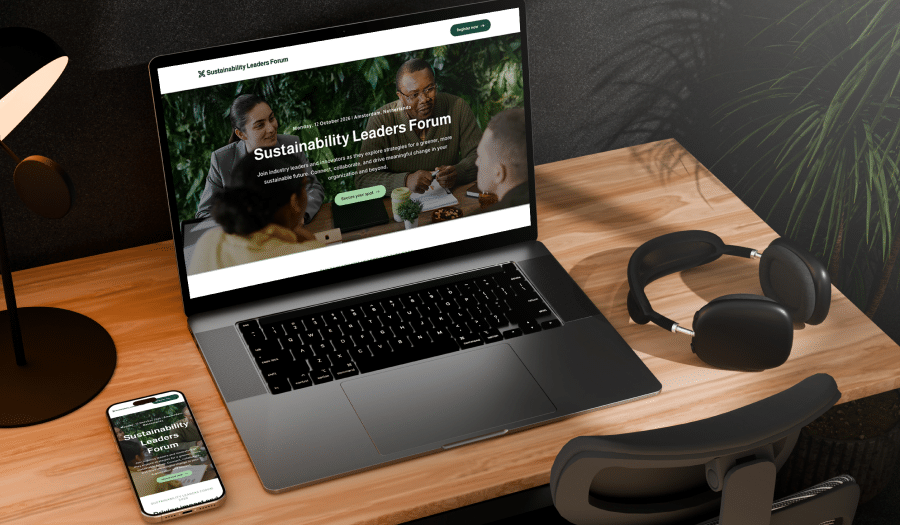
As many of you know, an event doesn’t simply end when the last guest leaves. If only, right? Rather, once you reach those final stages of an event’s lifecycle, you’re presented with the opportunity to reflect. An event debrief or retrospective is a crucial step in the event management process and taking an evaluative look at your journey will pave the way for continued success.
This reflective exercise helps event planners gather insights and data to enhance future events, ensuring continuous improvement and learning. Additionally, it provides a structured purpose for your events team to revisit goals, align results, and calculate ROI.
Here’s our comprehensive guide to understanding and conducting an effective post-event debrief.
What is an event debrief?
An event debrief is a structured review meeting held after an event concludes. Usually, this involves key event stakeholders, namely the core planning team and client, to understand what worked well and what didn’t.
The primary objectives of an event debrief could include:
- Evaluating the event against set goals and objectives
- Gathering and summarizing feedback from all stakeholders
- Identifying lessons learned
- Developing an action plan for improvement
We recommend conducting the post-event debrief as soon as possible after the event, whilst details are fresh.
Why is an event debrief important?
Here are several reasons why debriefing after each event is crucial:
Continuous improvement
Event debriefs are essential for continuous improvement. By evaluating the event’s outcomes against its objectives, planners can identify areas for enhancement and implement changes to deliver even better events. This includes logistical details, attendee feedback, budget management, and more.
Accountability
Debriefs ensure accountability by documenting who was responsible for various aspects of the event and evaluating their performance. This process helps in recognizing exemplary work and addressing any shortcomings.
Knowledge sharing
Sharing insights and experiences during a debrief promotes a culture of learning within the organization. Team members can learn from each other’s experiences and apply those lessons to future projects.
How to conduct a successful event debrief
Conducting a successful event debrief requires careful planning and a structured approach. At EventsAir, we typically look at the following three questions when conducting a post-event debrief on our customer conference, AirTime:
- What worked well?
- What didn’t work well?
- What would we do differently next time?
Here’s how to approach it (you can also download our free event debrief template here as well):
1. Prepare in advance
Schedule the debrief meeting shortly after the event to ensure details are fresh in everyone’s mind. Send out an agenda outlining the key topics to be discussed, such as event objectives, successes, challenges, and feedback. Share any feedback survey responses ahead of the meeting to allow everyone time to digest.
2. Gather data
Collect all relevant data before the meeting. This is going to be different for every event. As your goals and objectives shift, the data you’re basing your event debrief on should also shift.
For example, if attendee satisfaction is a primary objective, your most important dataset will be your post-event survey. On the other hand, if speaker engagement was a high priority, looking at session ratings or session engagement would be beneficial.
Other important datapoints may also include sponsor feedback, financial reports, logistical notes, and performance metrics. Your event management software should make this process effortless, ensuring you have a single source of truth for accessing and harnessing the most meaningful event data.
3. Create a safe environment
If aspects of your event didn’t go to plan, an event debrief is not the place to start pointing fingers. Encourage open and honest feedback by creating a safe and non-judgmental environment. In a culture where people feel safe, they are more likely to openly discuss mistakes and challenges, leading to genuine reflection and valuable insights.
4. Focus on core questions
Specifically, address the three core questions:
What worked well: Identify the successes and effective strategies. For example, if your event registration process was seamless and received positive feedback, this is something to highlight and replicate in future events.
What didn’t work well: Discuss the challenges and areas where the event fell short. Perhaps there were issues with the audio-visual setup or delays in the schedule. Understanding these pain points helps in planning better next time.
What would we do differently next time: Brainstorm actionable solutions and improvements for future events. If attendees mentioned that they wanted more networking opportunities, consider incorporating more dedicated networking sessions into your agenda.
5. Document findings
Document the findings from the debrief thoroughly. Create a report that includes a summary of discussions, key takeaways, and actionable recommendations. This documentation will serve as a valuable resource for future events.
Technology to support an event debrief
Leveraging technology can significantly enhance the effectiveness of your event debrief. Collecting the most relevant and actionable data should be seamless with comprehensive event management software.
Tools like EventsAir provide comprehensive post-event analytics and reporting features. These tools can help you collect feedback, analyze performance metrics, and generate detailed reports effortlessly. For example, EventsAir offers real-time tracking and analysis of attendee engagement, registration data, session attendance, and more.
Key features to look out for:
Surveys and feedback forms: Easily collect attendee and stakeholder feedback through customizable surveys.
Analytics dashboard: Access real-time data and insights on event performance.
Reporting tools: Generate detailed reports with visual representations of data. And create custom reports with powerful filtering.
40+ Key questions for your event debrief
To help structure your event debrief, here is a collection of key questions organized by category:
Objectives and goals
- Did the event meet its primary objectives?
- Were the event goals clearly communicated to all team members and stakeholders?
- How well did the event align with the overall strategy and brand message?
- Were the key performance indicators (KPIs) achieved?
Planning and preparation
- Was the planning timeline adequate?
- Were all deadlines met during the planning phase?
- How effective was the project management process?
- Were there any major challenges during the planning phase? How were they resolved?
- Did all team members understand their roles and responsibilities?
Marketing and promotion
- How effective was the marketing strategy in attracting attendees?
- Which promotional channels yielded the best results?
- Were there any challenges in executing the marketing plan?
- How did the actual attendee demographics compare to the target audience?
Registration and attendance
- Was the registration process smooth and efficient?
- Were there any issues with the registration platform?
- How did the actual attendance numbers compare to the expected numbers?
- How well did the event payment processing system perform?
Venue and logistics
- Was the venue appropriate for the event?
- Were there any logistical issues with the venue?
- How was the overall layout and flow of the event space?
- Were there any challenges with accessibility or accommodation?
Program and content
- How engaging was the event program? (Which sessions or activities received the most positive feedback?)
- How well did the abstract management system handle submissions and reviews?
- Were there any issues with the scheduling of sessions?
- How well did the speakers or facilitators perform?
- Were there any technical issues during the presentations?
Attendee experience
- What was the overall attendee satisfaction rate?
- What feedback did attendees provide about their experience?
- Were there sufficient networking opportunities?
- How effective were the event app or digital tools in enhancing the attendee experience?
Vendors and partners
- How well did the vendors and partners perform?
- Were there any issues with vendor deliveries or services?
- How well did the lead management system support their goals?
Budget and financials
- Was the event within the allocated budget?
- Were there any unexpected costs? If so, what were they?
- How effective was the budget tracking process?
- What was the return on investment (ROI) for the event?
Technology and equipment
- How reliable was the event technology (AV equipment, internet, etc.)?
- Were there any technical difficulties? How were they resolved?
- How effective was the event app or virtual platform?
- Did the event check-in process run smoothly?
Post-event follow-up
- How effective was the post-event communication strategy?
- Were all thank-you notes and follow-up emails sent promptly?
- How well were post-event surveys conducted and analyzed?
- What were the key takeaways from the post-event feedback?
Overall performance and improvements
- What were the major successes of the event?
- What were the main challenges or areas for improvement?
- How well did the team work together?
- What lessons were learned that can be applied to future events?
- What new ideas or innovations could be considered for future events?
Conclusion
Conducting a thorough event debrief is essential for the continuous improvement of your events. By systematically reviewing the successes and challenges of your event, you can gather valuable insights that will help you plan and execute even better events in the future. Event debriefs ensure accountability, enhance planning, and promote knowledge sharing.
At EventsAir, we understand the importance of a structured debrief process that is aligned with your internal goals. Our comprehensive event management software is designed to help you collect the most relevant and actionable data seamlessly. With features like real-time analytics, customizable surveys, and detailed reporting tools, EventsAir supports you every step of the way, from planning to post-event analysis.
If you would like to understand how we can help you streamline your event debrief process and leverage event management technology, schedule a demo with one of our team members today.
Best Practice | Event Planning & Management
See EventsAir in action
Discover why 12,000+ event professionals trust EventsAir to deliver effortless events, every time.





